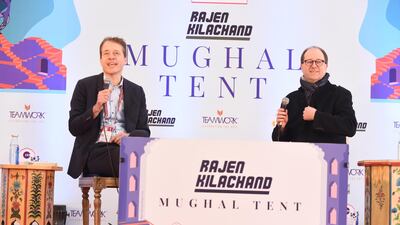The historian Sven Beckert has claimed that the legacy of slavery in the United States “is still very much with us” and that “history is having an impact on the structure of inequality in American society”.
Speaking at the Jaipur Literature Festival, Beckert, author of Empire of Cotton: A Global History, traced a line from the atrocities of the slave trade, particularly in the southern states during the 19th century, to the discrimination and marginalisation of African Americans in the country today.
“There is a direct continuity from the history of enslavement to the mass incarceration of African Americans,” he said. “The vast inequalities and the deep-seated racism that comes from a history of slavery is a legacy that is still very much with us in the United States.”
Beckert, a professor of American history at Harvard University, explained that when slavery was abolished in 1865, at the end of the American Civil War, African American prisoners were used instead as labour on the cotton plantations.
“The fact of the matter is that African Americans, for many generations, worked without being paid and without having the ability to accumulate property or capital,” he said. “Even though it is 150 years in the past, it is still having an impact on the structure of inequality in American society today […] It’s with us in the ideological sense – discrimination and racism – but also in terms of material legacy.”
Beckert continued: “Presumably, this applies to the history of colonialism. This history is not really over […] It influences our contemporary politics and I don’t think we can move beyond it and create a world that addresses these injustices without facing it.
“We need first to come to terms with this history and understand the violence, exploitation and discrimination, in order to build a world that is quite different in the contemporary.”
Beckert also called for an overhaul in the way that history is taught in schools and universities. “What most of us have done is teach history or write history from a national perspective, grappling with particular histories and particular places,” he said. “You cannot understand very important things about the history of the world by looking at things within a national context. You need to go beyond them, look at them from a global perspective.
“Ironically, one way of doing this is by looking at global history from a local perspective – look at one particular city and write the history of that city, not as a self-contained unit that can be explained out of itself, but as [one element] of a network of connections that go to all different parts of the world.”
The Jaipur Literature Festival runs until January 28. For more information, visit: www.jaipurliteraturefestival.org


